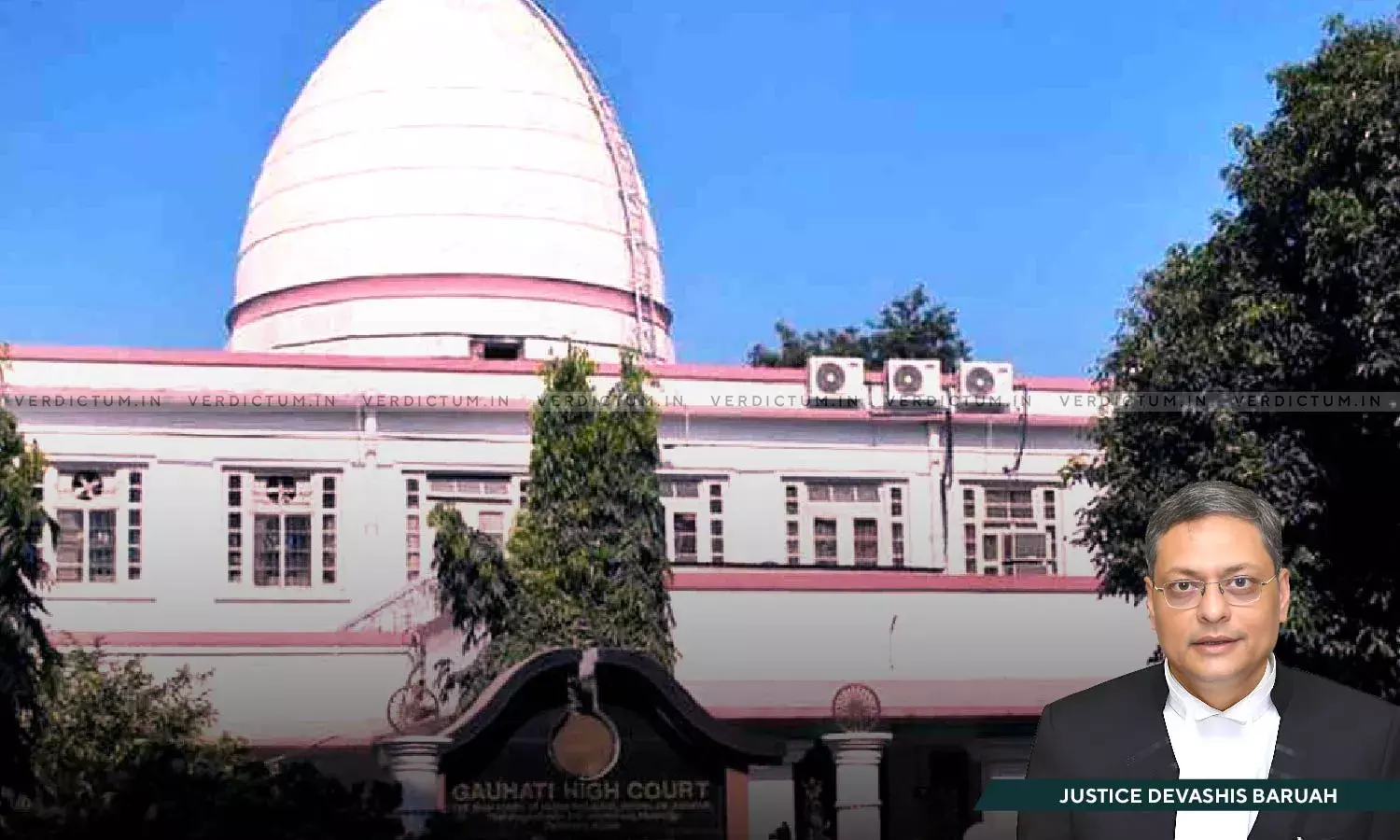Gauhati High Court Orders ₹ 5,00,000 Compensation For Unjust Handcuffing Of Advocate By Assam Police

Noting that the handcuffing of any person without just cause violates the mandate of Article 21 of the Constitution of India, the Gauhati High Court recently directed the Assam Police to pay a compensation of Rs.5,00,000/- to an Advocate for unnecessarily handcuffing him.
The Single Judge Bench of Justice Devashis Baruah was dealing with a Writ Petition filed by a lawyer alleging an infraction to Article 21 of the Constitution for violating his basic fundamental rights by the Police Authorities by handcuffing him without just cause.
Advocate M. Biswas appeared for the Petitioner while Advocate H. Sarma appeared for the Respondents.
Background: The Petitioner-Advocate faced charges in an FIR under Sections 294, 325, 341 and 353 of the Indian Penal Code, filed by a Police Home Guard, accusing the petitioner of manhandling him. Following the registration of the FIR, the petitioner was called to the Police Station, detained, and later arrested. It was the case of the Petitioner that the Police acted in violation of all mandates of law and dehors the guidelines issued by the Supreme Court, by handcuffing the Petitioner in the police station, despite his surrender, and further taking him for his medical checkup in handcuffed condition.
The Petitioner also stated that he was produced before the Chief Judicial Magistrate and was again handcuffed on his way back to the police vehicle and was under continuous handcuffed condition throughout his journey from the Court of the CJM to Central Jail, Guwahati at Lokhra which is about 20 km.
The Petitioner, aggrieved by the act of handcuffing, lodged a complaint with the Assam Human Rights Commission (AHRC), however, the Commission closed the petitioner's complaint, citing the demise of the charged officer as the basis for closure. Aggrieved, the Petitioner approached the High Court.
The High Court after considering the submissions, noted that the Petitioner had himself surrendered at the police station and it is an admitted fact by the Investigating Officer that he had handcuffed the Petitioner. The High Court accordingly framed the following points for determination: (i) Whether the Petitioner who was arrested could have been handcuffed and if so, under what circumstances? (ii) If there is any violation by the arresting officer, would the Petitioner be entitled for the compensation and if so, to what amount?
Answering the first issue, the Court referred to the Judgement of the Apex Court in Prem Shankar Shukla Vs. Delhi Administration (1980) 3 SCC 526 and observed, "...that tangible testimony, documentary or other, or desperate behavior, geared to making good escape alone would be a valid ground for handcuffing and fettering and even this may be avoided by increasing the strength of escorts or taking the prisoner in well protective vans. It was observed that even in cases where, in extreme circumstances, handcuffs have to be put on the prisoner, the escorting authority must record contemporaneously the reasons for doing so. Otherwise under Article 21 of the Constitution, the procedure would be unfair and bad in law. It was further observed that merely recording the reasons would not suffice as that can be a mechanical process mindlessly made and as such, the escorting officer, whenever he handcuffs a prisoner who is produced in the Court must show the reasons so recorded to the presiding Judge and get his approval."
Accordingly, finding the handcuffing of the Petitioner to be arbitrary, the Court held, "The Investigating Officer had acted contrary to the law declared by the Supreme Court in the three judgments referred to hereinabove. In that view of the matter, the first issue therefore is decided that the Respondent Authorities and more particularly the Investigating Officer on the facts of the case ought not to have handcuffed the Petitioner and such actions were contrary to the law declared by the Supreme Court and more particularly in the paragraph No.30 of the judgment of the Supreme Court rendered in the case of Prem Shankar Shukla (supra) as well as paragraph 16 to 21 of the judgments in the case of Citizens For Democracy."
Further, on the aspect of compensation, the Court relied on the Supreme Court's ruling in Nilabati Behera v. State of Orissa and Others (1993) 2 SCC 746, and held that the Police bears the responsibility for compensating the petitioner. The Court emphasized that handcuffing the petitioner without just cause amounted to a violation of Article 21 of the Constitution. Furthermore, the Court underscored that the compensation owed should be determined by applying the principles of strict liability.
The Court accordingly noted that the imposition of compensation should also be such that the concerned police officer should follow the applicable law in both letter and spirit and directed the Respondents to pay a compensation of Rs.5,00,000/- to the Petitioner within a period of 2 (two) months from the date a certified copy of this judgment is served upon the Director General of Police, Assam.
Cause Title: Sabah Al Zarid v. State Of Assam And 3 Ors [WP(C)/2783/2021]

